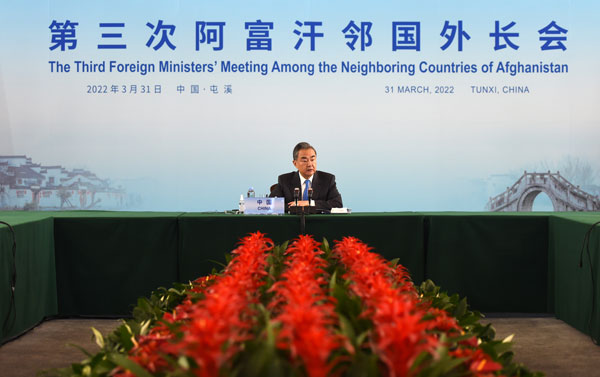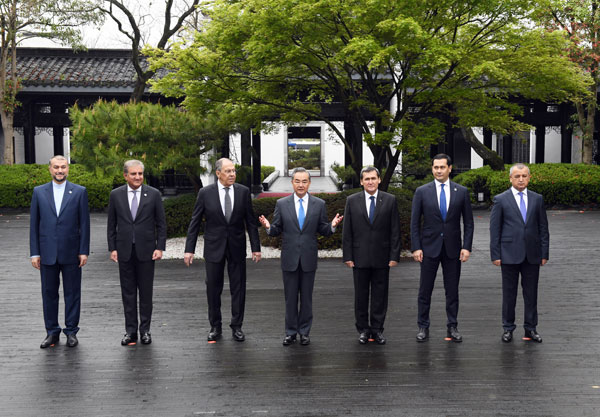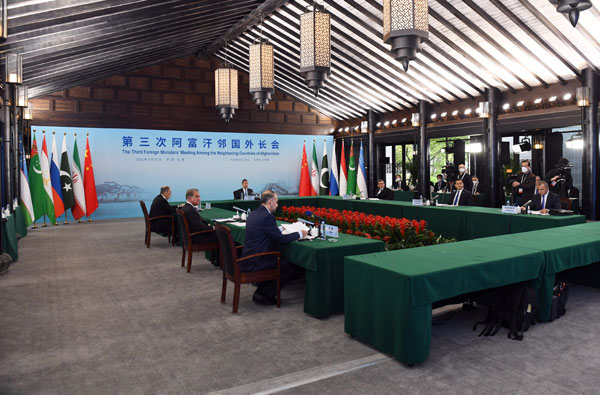Wang Yi Chairs the Third Foreign Ministers' Meeting on the Afghan Issue Among the Neighboring Countries of Afghanistan

On March 31, 2022, State Councilor and Foreign Minister Wang Yi chaired the Third Foreign Ministers' Meeting on the Afghan Issue Among the Neighboring Countries of Afghanistan in Tunxi, Anhui Province.
Wang Yi first read out President Xi Jinping's written remarks and spoke on behalf of China.
Wang Yi said that Afghanistan is now at the critical stage of moving from chaos to stability. The Afghan people are presented with a historic opportunity to truly take their future into their own hands. Over the past six months, the Afghan Interim Government has made efforts to stabilize the situation, improve people's livelihood and protect human rights, and achieved certain phased results. However, Afghanistan still faces multiple challenges such as humanitarian issues, economy and security. The international community, including Afghanistan's neighboring countries, also showed many concerns about the governance of the Afghan Interim Government. Afghanistan still has much to do in order to achieve lasting peace and sustainable development and promote foreign relations.
Wang Yi said that in the face of Afghanistan at the crossroads of history, we have timely established the mechanism of coordination and cooperation among Afghanistan's neighboring countries and reached the political consensus on cooperation in coping with the changes in the situation in Afghanistan, which fully embodies the spirit of good-neighborliness, friendship and mutual assistance between good neighbors. We should uphold the concept of a community with a shared future, take our neighbors as friends and partners, give further play to the unique role of the mechanism of coordination and cooperation among Afghanistan's neighboring countries, promote stable development in Afghanistan at an early date, and work together to achieve lasting security, development and prosperity in the region.
Wang Yi put forward three suggestions.
First, we should support Afghanistan in embarking on a path of self-reliance and self-improvement. We should support the Afghan people in independently determining the future of the country, truly implementing the "Afghan-led, Afghan-owned" principle, realizing Afghan national reconciliation and domestic solidarity, and exploring a governance model that conforms to Afghanistan's national conditions and the development requirements of the times. We are firmly opposed to non-regional countries' acts that create chaos in Afghanistan and use Afghanistan to engage in geographical rivalry. We should encourage and support Afghanistan's efforts to build a broad-based and inclusive government, exercise moderate and prudent governance, adhere to good-neighborliness and friendship, and protect the fundamental rights of all Afghan people, including all ethnic groups, women and children. We should stay patient and focused, steadily seek solutions that are in line with the common concerns and interests of all parties, and promote Afghanistan to fulfill its foreign commitments and assume its due responsibilities.
Second, we should support Afghanistan in embarking on a path of prosperity and progress. The most imperative task at hand is to provide humanitarian assistance for Afghanistan. What matters in the long run is to improve Afghanistan's capacity for self-reliant development. It is an essential step to synergize international forces to assist Afghanistan. China has provided Afghanistan with emergency assistance such as food, vaccines, medicine and winter supplies, and is willing to promote and support Afghanistan's integration into the regional economic pattern and participation in regional coordinated development. We should promote synergy among the international community's bilateral and multilateral mechanisms related to Afghanistan and increase their positive effect, and support the United Nations in playing its due role. We should respect the dominant position of the Afghan Interim Government in accepting foreign aid and oppose the politicization of humanitarian aid. We should urge the United States, as the culprit that caused the difficult situation in Afghanistan, to take the primary responsibility, stop unilateral sanctions and unconditionally return Afghanistan's national assets.
Third, we should support Afghanistan in embarking on a path of peace and development. We should promote Afghanistan to take comprehensive and multi-pronged measures to cut off terrorism at the source, resolutely crack down on all kinds of extremist terrorist organizations, including the Islamic State and the East Turkestan Islamic Movement, and ensure that Afghanistan will no longer become a hotbed, harbor or source of terrorist forces. We should address both the symptoms and root causes of the refugee and drug problems, help Afghanistan deal with urgent livelihood issues, and support Afghanistan in carrying out alternative cultivation, so as to jointly eliminate regional drug sources.

Wang Yi stressed that solving the Afghan issue requires collective wisdom and joint efforts. We should further build regional consensus, make the voice of neighboring countries heard, and contribute to neighboring countries' solutions, so as to promote Afghanistan to create a brighter future and achieve lasting peace in the region.
Foreign ministers of neighboring countries attending the meeting thanked President Xi Jinping for his important remarks injecting strong impetus into the mechanism of coordination and cooperation among Afghanistan's neighboring countries, and appreciated China's important role in gathering the concerted efforts of neighboring countries and supporting Afghanistan's peace and reconstruction. They agreed that coordination and cooperation should be strengthened to help Afghanistan achieve peace, stability and economic reconstruction, and agreed to support and guide the Afghan Interim Government to earnestly fulfill its commitments and actively respond to the expectations of the international community, especially the expectations of its neighboring countries. They stressed that the United States and NATO should earnestly assume the primary responsibility for the reconstruction and development of Afghanistan and return the property of the Afghan people as soon as possible.
UN Secretary-General António Guterres delivered a video speech. He spoke highly of the generous support of China and other neighboring countries to the Afghan people, pointed out that the solidarity of neighboring countries of Afghanistan demonstrated the spirit of the global community, and proposed to strengthen humanitarian assistance, economic revitalization, constructive engagements and cooperation.
The Joint Statement of the Third Foreign Ministers' Meeting on the Afghan Issue Among the Neighboring Countries of Afghanistan and the Tunxi Initiative of Afghanistan's Neighboring Countries on Supporting Afghanistan's Economic Reconstruction and Practical Cooperation were released at the meeting. The meeting announced the launch of the mechanism of the regular meeting of special envoys for Afghan affairs, and the establishment of three working groups on political diplomacy, economy and humanity, and security and stability. Uzbekistan will host the fourth Foreign Ministers' Meeting on the Afghan Issue Among the Neighboring Countries of Afghanistan.
Turkmen Deputy Prime Minister and Foreign Minister Rashid Meredov, Uzbek Deputy Prime Minister and Minister of Investments and Foreign Trade Umurzakov Sardor Uktamovich, Russian Foreign Minister Sergey Lavrov, Pakistani Foreign Minister Shah Mahmood Qureshi, Iranian Foreign Minister Hossein Amir-Abdollahian and Tajik Justice Minister Muzaffar Ashurion attended the meeting.


Follow us on WeChat
京ICP备18041594号-1
京公网安备 11010202005508号

Follow us on WeChat


